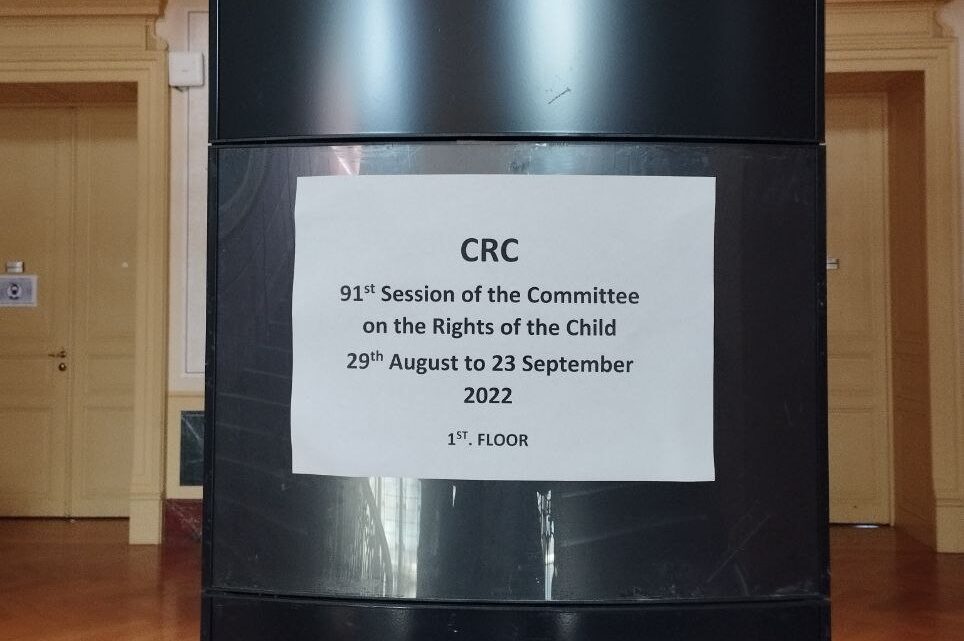How demolitions and unregulated construction infringe on children’s rights in Uzbekistan
19.09.2022The Tashkent SNOS group, together with other activists in Uzbekistan, participated in the preparation of an alternative thematic report on the implementation and guarantee of the right of the child in Uzbekistan in line with international obligations under the Convention on the Rights of the Child. This report was considered at the 91st session of the CRC Committee on 31 August and 1 September 2022. where Uzbekistan presented its 5th country report.
This report has been prepared with the support of the OHCHR to facilitate dialogue between the CRC Committee and the Uzbek delegation to inform the CRC Committee on the implementation of the CRC Committee’s Concluding recommendations in order to improve Uzbekistan’s compliance with its obligations under the CRC.
NB : In compiling the report, the coalition was not able to provide sufficient statistical data for each cluster of the report as the authorities do not publish statistics in the public domain.
Here I will only cite those points in the report which speak of the detrimental impact of demolition and wild unregulated construction on children’s rights. The full report is available here:
Alternative report on CRC_Uzbekistan_91 session_CRC_2022
Right to life, survival, development and respect for the views
Articles 6 (2), 3 12,
- The CRC Committee (para. 21, CRC/C/UZB/CO/3-4) recommended that the State party implement regulations to ensure that the business sector complies with human rights and environmental standards with regard to child rights.
- However, intensive urbanization processes, launched by the government of Uzbekistan in 2016, go without the master plans of cities and with violation of urban planning norms. Mass development plots chosen at random by the developers themselves are allocated by the municipalities without being discussed with the public. Cities are built up randomly, reducing green common spaces, playgrounds for children. Entire established neighborhoods with their social infrastructure and green areas are being demolished. Between apartment buildings, municipalities are trying to squeeze new multi-storey buildings with commercial and residential spaces. City parks are transferred to private firms for their commercial interests. This violates the right to adequate housing, which includes the right to a healthy environment.
- The rapid construction in recent years in Uzbekistan has led to the formation of a large amount of sand and dust rising into the air at any wind force. In Tashkent, the air quality index (AQI) is much lower than in the capitals of neighboring states. In 2021, only a few days were “with good air quality, and the rest – with bad or even dangerous AQI. The Ministry of Health is reporting an increase in the number of cases of obstructed breathing in ambulances.
- Intensive construction is carried out in close proximity to the PPE and schools. For example, in Yakkasaray district of Tashkent, a 24-storey residential complex “Modera Towers” is being constructed between two schools No. 160 (secondary) and No. 25 (for children with disability), literally 10 meters from the walls of each school. The construction works cause the buildings of the school to shake, frightening children, and fill the air with dust. The Director of the school gave her written consent for the construction and provided a part of the school grounds for the needs of the developer.
- Public and judicial authorities of Uzbekistan exert psychological pressure on families: urbanization is accompanied by massive demolitions of housing and forced evictions, which grossly violates the existing legislation. The courts decide on the forced eviction of persons from their private homes using the provisions on eviction from municipal housing as well as the provisions on demolition for public purposes, whereas these are strictly commercial interests of private enterprises. The eviction procedure is not laid down in the legislation and takes place in extremely harsh conditions: enforcement agents break down gates, doors, windows, take out things, talk rudely, threaten to kill dogs (if any). There are no exceptions due to illness, pregnancy or weather. Children suffer from the nervousness of their parents and from the uncertainty.
- In contrast to what para. 47 of CRC/C/UZB/RQ/5 states concerning the rights of children to be heard in court proceedings, developers and judges do not take into account the interests of children when evictions are carried out, and children are not heard or even are expelled from the courtroom. Often, when evicted one is offered accommodation which is 6-7 km away from the present. This means that children will not be able to go to their own school, will not be able to maintain contacts with their friends and teachers.
Examples:
- Case of О.А.: O.A. lives in her own house. Her daughter and three grandchildren live with her: two schoolchildren, and a baby born in 2020. Children go to a secondary school and a music school both nearby, and attend sports classes. O.A.’s family is evicted by a private developer who wants to build several high-rise apartment buildings for commercial sale. At the same time, the developer offers a house which is 7 km away from the present. All requests from O.A. to provide her an apartment with an appropriate area in the current place are refused by the developer, as it is a very expensive district. Supreme Court judges refused to hear the views of O.A.’s underage grandchildren and expelled from the courtroom.
- Case of D.М.: 15 people, including 9 children (both boys and girls) live and are registered in the big house of D.M. of 300 sq. m area. These are essentially four families: 1) D.M. with a wife and four daughters: 1 to 12 years old; 2) A mother of D.M and his brother 29 years old; 3) A sister of D.M. and her three children 11 and 15 year old boys and 14 year old girl; 4) A sister of D.M and her two daughters – 8 and 9 years old. All children go to school nearby, and families do not want to change schools. The developer evicts these families to construct commercial elite housing. All four families asked to be given apartments in the neighbor building built by the same developer, but he refused because of the high cost. In accordance with article 27 of the Housing Code, “In the event of the demolition of residential buildings owned by citizens… owners, by their choice and by agreement of the parties, are given ownership of another equivalent well-equipped housing unit of an area not lower than the social norm». Therefore, D.M.’s family should have received an apartment with a total area of 240 sq. m., however, they are given two flats with a total area of 135 sq. m. “How to accommodate four families in two apartments?”
- The roads and streets of Uzbekistan are deadly for children. The number of officially registered traffic accidents in 2021 was 10001. The victims of accidents were 2,426 people (including 263 children). In the first three months of 2022, there were 1,469 accidents registered, of which 204 involved children. As a result, 188 children were injured and 39 died. The main causes of accidents are: non-compliance with traffic rules, improper organization of traffic and lack of necessary infrastructure. The permitted driving speed in Uzbekistan is 70 km/h. And no public appeal to the authorities to reduce the permitted speed and to install regulated pedestrian crossings where they are indeed needed has been successful.
Recommendations:
- To ban construction in cities without approved master plans and oblige local authorities to place demolition decisions with reference to the Master Plan on their website.
- To oblige statistical agencies to publish data on house demolitions related to land seizures by the State.
- To prohibit forced evictions by law and in practice including through introduction of an administrative and criminal sanction for forced evictions.
- To prohibit the construction of new housing units in established neighbourhoods and near schools and PEE.
- To provide for mandatory playgrounds and green areas of sufficient space in new construction.
- To consider the views of the child before the forced eviction courts.
- To organize road traffic taking into account the interests of children: to establish safe pedestrian crossings, to install information panels, to reduce the driving speed within settlements.
Right for education
Articles 27 (1), 28
- 240 of the Fifth periodic report, submitted by RUz, says: «The country’s education system comprises 9,680 general education schools with around 5 million pupils. There are 6,724 schools in rural areas, or 69.5 per cent of the total, and 2,956 schools in urban areas, 30.5 per cent of all schools. At the same time, according to demographic statistics, as of 1 April 2022, the urban population reached 18.02 million (50.9 per cent of the total population), and the rural population reached 17.4 million (49.1 per cent). This means that urban schools are more than twice as densely populated as rural schools.
- MoPE notes that, to date, the number of pupils (6.24 million) in the country significantly exceeds the design capacity of schools (5.06 million). This situation leads to overcrowded classrooms and more than 70 per cent of schools operate in double or triple shifts. In order for children to attend school conforming the minimum standards, it is necessary to increase their capacity by 1.2 million.
- Despite a significant increase of the population of the RUz from 1991 to 2020 (+16 million people), the number of schools has decreased over this period. The reason of that is the transition to 9-year education in the schools between the period from 2010 to 2017. During this period, 1500 colleges and lyceums were built, but no attention was paid to schools. After the renewal of 11-year education in the schools in 2018 only 400 lyceums and colleges were revert to schools. Buildings of many schools were conveyed to other organizations for different reasons. MoPE is currently working on return of these former school buildings and the list includes 16 schools in Tashkent, that were conveyed to different ministries and agencies, but the process is not easy one.
- Examples of non-returned schools:
- The new quarter called “Tashkent-City” is being built on the site of the demolished old mahalla (neighbourhood) Ukchi, where the 76th secondary school was functioning. The construction of the Tashkent City mega-project with elite housing does not provide for the construction of public schools and kindergartens.
- In the Academ-gorodok in Tashkent there were two middle schools (#113 and #27), as well as college of Information Technology, which was reorganized into a special mathematical school named after. Al-Khwarizmi. In recent years, the 113th school was conveyed to the SCO Secretariat. The math school was moved 6 km away, and the school building was demolished and a mosque is being built instead. As a result, out of three middle schools in this densely populated area, one school remained.
- Medical College named after Borovsky was closed and demolished in response to a huge scandal involving the murder of a student by his fellow students on college grounds.
- Between 2018-2020 57,7 thousand new houses were built in Uzbekistan, while the number of newly built schools is 56, despite there is a need in 158 new schools. For example, in Samarkand massif Motrit many houses were built. However only one school with 1680 spaces was built. There is a need in 4 more schools there.
- The Presidential Decree PD-4884 as of 6 November 2020 provides for the creation of new places of study, respectively the construction of new high-rise buildings. The developer should take into account the creation of at least 1.5 places for pupils per apartment when developing the plan of the object. However, new residential districts are still being built without schools and kindergartens. For example, Presidential Decree PD#335 dated 28 July 2022 stipulates the construction of residential and commercial complexes instead of factories moved from Tashkent to another city, with a total area of 6.1 hectares. But this Decree does not provides construction of state schools, kindergartens and medical centers in the quarters to be built.
- Concerning the PEE: The territory of PEE are taken away for other commercial purposes: construction of high-rise building, business centers, or even for construction of houses of oligarchs. Only within a one-kilometer radius of the Buyuk Ipak Yuli Metro Station in Tashkent four kindergartens were closed and later demolished in the last few years. A business center, a five-storey apartment building, a villa of an oligarch was built on the vacated areas. The building of the fourth kindergarten was given to a private company as compensation for the property seized from it in the process of demolition of the shopping mall on Navoi Avenue in Tashkent. As a result, only two State-owned PEEs remained in this densely populated area.
- According to CRC/C/UZB/RQ/5 (para. 128 и 130), in 2021, 1,699,566 children, or 60.9 per cent of the population of pre-school age, were enrolled in pre-school education. There are 18,254 such centres, including 6,197 State and 12,057 non-governmental kindergartens. Despite the increase in the number of private PEEs, they cover only 33.8 per cent of children attending PEEs, since most families in Uzbekistan cannot afford private kindergartens because of the very high fees (on average from 200 USD and above, which is the average salary in the country)
Recommendations:
- To introduce in the City Planning Code the obligation to plan the construction of public schools and PEEs in the construction of new residential blocks.
- The Government of Uzbekistan should allocate funds from the state budget for the construction and maintenance of new schools and PEEs, providing them with the necessary teaching staff and equipment.
- To introduce strict monitoring of compliance with PSR when issuing building permits
- To oblige the State to eliminate the demolition of PEEs and schools for commercial purposes, make educational institutions more accessible to children by increasing budgetary allocations for the construction of new kindergartens and schools.
Non-discrimination (Article 2)
- Since the State has undertaken commitment to provide basic education, it should strive to make it equal for all, since the future of children depends on it. However, the government itself creates inequality in education, including the so-called presidential schools. While in some areas during the winter, children are educated in cold schools and overcrowded classrooms, presidential schools provide conditions, which are not available in any other public school, although both types of schools are financed with taxpayers’ funds. In Presidential schools there are no more than 24 pupils per class, while classes in an ordinary school often have more than 40 pupils. The specialized boarding schools in the ADPCS system will provide students with accommodation and food free of charge.
- Agency for the Development of Presidential, Creative and Specialized Schools (ADPCSS) under the CM of RUz was established in accordance with DP-5815 as of 9 September 2019. The Presidential Schools and specialized school related to the MoPE, MoHSSE, MoITC and MoID were transferred under institutional affiliation of ADPCSS. In September 2021, 576 pupils were studying in four presidential schools, in three specialized and nine creative schools – about 1,500.
- According to the State Procurement Portal, about 60 billion soum was allocated for the construction of the presidential school in Bukhara in 2020. Construction of the 168-seat presidential school in Termez was preliminary estimated at 41.5 billion soum. The construction of a regular school for 1,540 seats with a gym was estimated only at 34.4 billion soum.
- According to the Uzbek Constitution «benefits can be established only by law and must comply with the principles of social justice» (art. 18), «children are equal before the law regardless of the origin and civil status of parents» (art. 65). However, the state provides benefits for the admission to higher education of children of military personnel and employees of internal affairs bodies. A draft law has been brought to the discussion to provide similar benefits for the children of customs officers. It turns out that all children are equal, but the children of some parents are more equal than others? Do not, for example, teachers or doctors deserve benefits for their children?
Recommendations:
- To eliminate socially unjustified benefits that violate the principle of social equality
- To ensure that all public schools in the country have the same conditions of study, regardless of their institutional affiliation.


